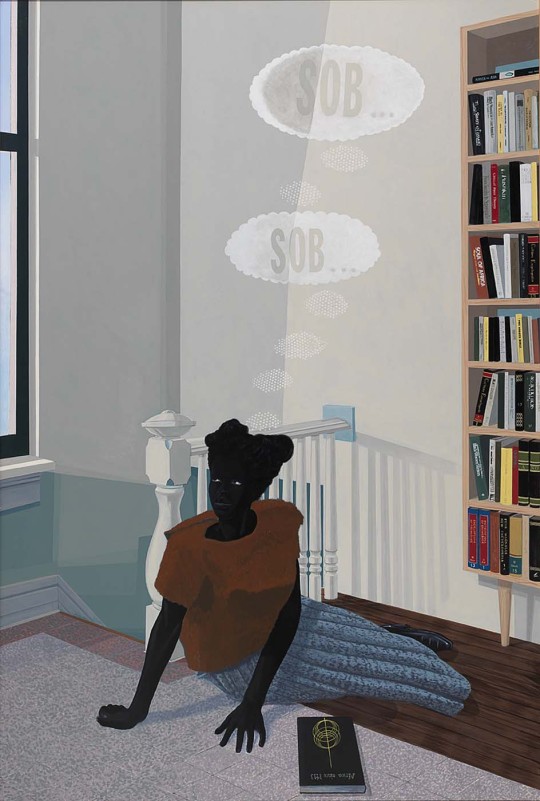Don't wanna be here? Send us removal request.
Photo

Kerry James Marshall, SOB, SOB, 2003, acrylic on fiberglass, Smithsonian American Art Museum, Museum purchase through the Luisita L. and Franz H. Denghausen Endowment -Melissa, Intern
484 notes
·
View notes
Quote
The primacy of the enunciation refers us once again to the conditions of minor literature: it is the expression that precedes or advances - it is the expression that precedes contents, whether to prefigure the rigid forms into which contents will flow or to make them take flight along lines of escape or transformation... And it is one and the same desire, one and the same assemblage, that presents itself as a machinic assemblage of content and as a collective assemblage of enunciation.
Gilles Deleuze and Felix Guattari, Kafka; Toward a Minor Literature (85)
17 notes
·
View notes
Quote
True thoughts are those alone which do not understand themselves.
Theodor W. Adorno, Minima Moralia (via philosophybits)
406 notes
·
View notes
Text
“The heart in mourning prompts us to think.”
— Emil Cioran (1911-1985), from “Tears and Saints” (1937), translated from the Romanian by Ilinca Zarifopol-Johnston
97 notes
·
View notes
Photo

Liang Quan (Chinese, b. 1948) - Wisteria Blossom in the Lodge of Retirement II, Ink, color and rice paper collage, 160.5 × 122cm (2017)
160 notes
·
View notes
Quote
The segments are simultaneously powers and territories – they capture desire by territorializing it, fixing it in place, photographing it, pinning it up as a picture, or dressing it up in tight clothes, giving it a mission, extracting from its image of transcendence to which it devotes itself to such a degree that it comes to oppose this image to itself... But we must also declare as well that an assemblage has points of deterritorialization; or that it always has a line of escape by which it escapes itself and makes its enunciations or its expressions take flight and is articulate, no less that the contents that deform or metamorphose; or that the assemblage extends over or penetrates an unlimited field of immanence that makes the segments melt and that liberates desire from all its concretizations and abstractions or, the very least, fights actively against them in order to dissolve them.
Gilles Deleuze and Felix Guattari, Kafka; Toward a Minor Literature (86)
12 notes
·
View notes
Quote
On the one hand, general is not opposed to individual; general designates a function, and the most solitary individual has a function that is all the more general in that it connects to all terms of the series through which it passes
Gilles Deleuze and Felix Guattari, Kafka; Toward a Minor Literature (84)
25 notes
·
View notes
Quote
And it is not enough to say that the assemblage of enunciation produces the statement as a subject would; it is in itself an assemblage of enunciation in a process that leaves no assignable place to any sort of subject but that allows us all the more to mark the nature and the function of the statements, since these exist only as the gears and parts of the assemblage (not as effects or products).
Gilles Deleuze and Felix Guattari, Kafka; Toward a Minor Literature (84)
5 notes
·
View notes
Quote
The most individual enunciation is a particular case of collective enunciation.
Gilles Deleuze and Felix Guattari, Kafka; Toward a Minor Literature (84)
17 notes
·
View notes
Quote
This implies a certain method, both a procedure (procedure) of expression and an operation (procede) of content."
Gilles Deleuze and Felix Guattari, Kafka; Toward a Minor Literature (78)
8 notes
·
View notes
Quote
Faraway is opposed to close, contiguous is opposed to distant. But in the grouping of experiences and concepts, faraway is equally opposed to distant, contiguous opposed to close.
Gilles Deleuze and Felix Guattari, Kafka; Toward a Minor Literature (78)
11 notes
·
View notes
Quote
At the heart of my thoughts I wasn’t I.
Fernando Pessoa, The Book of Disquiet (via weltenwellen)
179 notes
·
View notes
Quote
Paranoid law gives way to schizo-law; immediate resolution gives way to an unlimited deferral; the transcendence of duty in the social field gives way to a nomadic immanence of desire that wanders all over this field.
Gilles Deleuze and Felix Guattari, Kafka; Toward a Minor Literature (72)
18 notes
·
View notes
Quote
Grasp the world," instead of extracting impressions from it; work with objects, characters, events, in reality, and not in impressions. Kill metaphor … This is why subjective impressions are systematically replaced by points of connection that function objectively as so many signals in a segmentation, so many special or singular points in a constitution of a series. To speak here of a projection or a phantasm would be to compound the error … these characters exist only as objectively determined pieces and cogs of a machine of justice.
Gilles Deleuze and Felix Guattari, Kafka; Toward a Minor Literature (70)
56 notes
·
View notes
Quote
The points of connection between series or segments, the remarkable points and the singular points, seem in several respects to be aesthetic impressions. They are often sensible qualities, odors, lights, sounds, contacts, or free figures of the imagination, elements of a dream or a nightmare. They are connected to chance.
Gilles Deleuze and Felix Guattari, Kafka; Toward a Minor Literature (69)
12 notes
·
View notes
Text
“The stars were over him and he was staring and staring at the spaces between them. The word stare, he said, comes from the Flengarian verb stareo, which means to eye the detention of thought, or to contemplate. But stareo itself comes from another Flengarian word, starus, meaning star. Stareo starum, reads the first line of a poem by Selenus–poem number 111–and scholars have argued for centuries about how to translate these words. I stare at the star, runs the conservative translation. And yet this translation ignores the potential that we might read the noun, starum, as an objective form of the verb, stareo, in which case the translation would go something like: I stare at the act of staring, or, I contemplate contemplation. The matter becomes further complicated in light of other and less literal interpretations, such as that the poet might have been writing from the perspective of the star, or that the word starus was often used during the first century after the birth of Christ (and the death of Selenus) as slang for infinity. And so we find that from one line of poetry written more than two thousand years ago a seemingly endless line of potential meanings emerge: 1. I star the star. 2. I contemplate infinity. 3. I am a star, staring myself. 4. I can’t stop staring. 5. I am infinitely stared at. 6. The star lasts as long as I stare at it. 7. I stare forever. 8. I immortalize the star.”
– Joseph Cardinale, from “May I Not Seem to Have Lived”
73 notes
·
View notes
